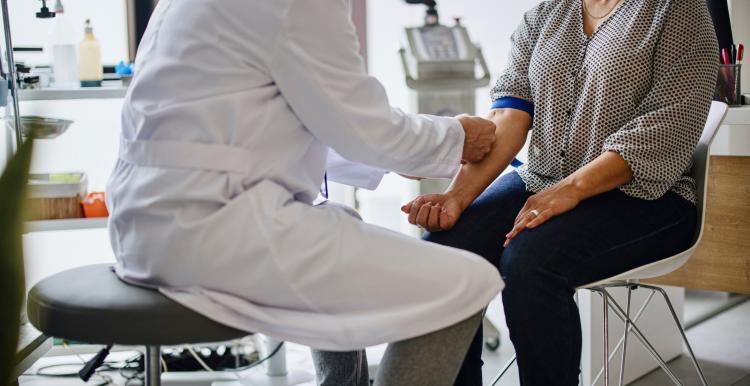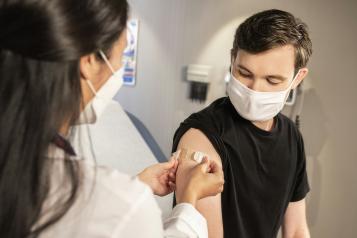What are people telling us about prevention and early intervention?

Why prevention matters
Health leaders often discuss the importance of prevention and early intervention services in helping people avoid ill health or death or identify problems early to prevent them from worsening.
These services not only benefit patients, they can also reduce the demand for care on an NHS that is already under pressure.
The NHS Ten Year Plan sets out an ambitious agenda for healthcare in England, with prevention of ill health and early intervention as central pillars.
The plan includes aims to reduce smoking and problem drinking, tackle obesity, improve children’s mental health, access to vaccines, and screening opportunities.
People tell us how prevention can be life-changing. Done right, it can help people avoid complications, stay out of the hospital, and get support when it’s needed most:
“I get a regular appointment for diabetes and Long Covid - It is all very efficient. I went to my GP for a long covid check and they spotted a mole and referred me there and then. My surgery is amazing and I get fantastic care!”
Story shared by Healthwatch Warwickshire
Four barriers that people face
Positive experiences are not, however, universal.
Analysis of the stories people have shared with us indicates four key barriers to accessing prevention and early intervention services: poor information and promotion, inaccessible services, inflexible services, and missed opportunities for earlier intervention.
1.Poor information and promotion
Public health services like stop-smoking and weight management classes can help prevent disease at a later stage. However, we heard that services weren’t always promoted to people, either by service providers or by health services like GPs.
Healthwatch Blackburn and Darwin examined local pharmacies offering the stop-smoking service. They found little promotion of the service within the pharmacies. They also found that GPs and dentists' signposting to the local stop-smoking service provision was poor and did not meet National Institute for Health and Care Excellence (NICE) guidelines.
Regarding routine screening (e.g., mammograms, bowel and cervical screening) and vaccination services, people have also told us that the information the NHS provides is not in a format they can understand. This leaves people confused as to why routine screening and vaccinations are important.
For example, Healthwatch Islington found that there were several barriers to people taking part in stop smoking services for people from different ethnic groups. These included a lack of information in their languages.
People also wanted information promoted in places where they are more likely to see it. For example, Healthwatch Barking and Dagenham found that people wanted information about bowel cancer screenings to be provided in community settings such as places of worship and libraries.
We also heard that information about screening services didn’t include details that would make people more likely to take up the opportunity. For example, Healthwatch Redbridge’s research on cervical screening found that a third of all women interviewed didn’t know that different speculum sizes were available, which could improve their overall screening experience.
Technology is increasingly being used in prevention, but people are not always given sufficient information. For example, in our 2022 research about blood pressure monitoring at home, we found that GPs did not give people enough information about how to use their blood pressure monitors or how to submit readings regularly.
2.Inaccessible services
People have also told us that they cannot always access prevention and early intervention services, especially if they first need to make a GP appointment.
For example, women have talked to us about the difficulties that they experienced in trying to make an appointment with their GP surgery for a smear test:
“I tried to call my GP practice yesterday around 12pm. I was on hold for over 40 minutes and just hung up in the end. Every time I go in the GP surgery no one is there. Why is no one answering the phone? I have received letter to book my smear test and it’s impossible to do”
Story shared with Healthwatch England
People also told us services weren’t always accessible for those who needed reasonable adjustments. The rollout of community diagnostic centres should make it easier for people to access diagnostic tests and scans in convenient locations. Still, we heard that centres didn’t always meet people’s needs for reasonable adjustments.
We heard about:
- services failing to meet people’s communication needs.
- barriers for d/Deaf people and people experiencing hearing loss.
- issues with English language interpretation.
- barriers for people with mobility difficulties, Autism, and dementia.
Dental and mental health services can both be essential in providing both preventative care and early intervention, but are inaccessible for many people.
For example, everyone should have a dental check-up at least every two years. The purpose of these is to check your oral health. However, an issue people frequently tell us about is that they can’t get an NHS dental appointment. In a national poll we ran in 2024, 16% of adults hadn’t seen an NHS dentist in the last two years because they couldn’t get an appointment.
When it comes to NHS mental health services, we have heard repeatedly about how people cannot access services until their condition has escalated to a crisis. People tell us they are often unable to access support whilst their mental health issue is less severe, meaning chances to prevent escalation are missed.
There is no prevention work or support, it has to get to a crisis where people attempt to take their own lives and then services step in.
3.Inflexible services
People also tell us that prevention services are not flexible enough to meet their individual needs. For example, Healthwatch Thurrock found that local stop smoking services focused solely on providing nicotine patches and similar products, but not on how to address the emotional triggers that lead people to smoke in the first place.
When health prevention services, like stop-smoking or weight management, focus on meeting people's individual needs, it can make a real difference to patients.
“The weight management practitioner was really good. I was sceptical and anxious due to shame about my obesity, but she put me at my ease and was very non-judgmental. She really knew her stuff re weight loss and nutrition.
"She had an in-depth understanding and compassion for just how hard it is to overcome compulsive eating. In the 5 sessions we explored in detail the emotional and behavioural aspects of my attempt to lose weight.
"Thus far I have lost 36kg and seen several significant health and self-esteem benefits. My blood pressure is back to normal. I am so pleased with this service.”
Story shared with Healthwatch England
We also heard about services that didn’t fit into people’s lives. For example, people told us that services were only provided during normal working hours, making it difficult for them to access.
In our community diagnostic centre research, we heard that people were often referred to diagnostic centres in locations or at times that didn’t suit them. This issue particularly affected working people who were not given a time that worked around their jobs.
4.Missed opportunities for early intervention
We also heard about cases where there was a chance to intervene early, but this was missed, with damaging results in some cases:
[The GP practice] didn't tell patient they had chronic kidney disease diagnosis and they found out 10 months later by accident while attending another NHS provider at the hospital after an accident. They are upset especially because they may have missed an opportunity to prevent a foot condition that has developed later.
Our recommendations
-
The Government and NHS should better measure how prevention funding is spent and its impact on NHS and public health services.
Despite the shift from sickness to prevention being central to the 10-year health plan, there is no overall analysis of prevention spending in health and care and its impact on wider budgets. With large real-term cuts to public health grants in the last 10 years, this is needed to ensure this shift happens in reality.
-
Make prevention and early intervention services easier to access
We know that people sometimes struggle to access these services. Similar to our recommendations in our recent report on choice in GP booking, all services should offer multiple booking routes (phone, online, in-person) as well as evening and weekend sessions. Signposting between GP, pharmacy and public health services should be routine.
-
Ensure all services, especially Community Diagnostic Centres (CDCs) are complying with the Accessible Information Standard (AIS)
Integrated Care Boards should ensure that all AIS requirements are being met in the operation of services, especially CDCs, to ensure that disabled people have their communication needs met when accessing these services.



